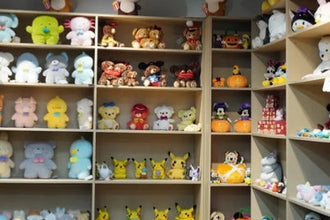In a diverse marketplace for consumers, the niche market is thriving, which means the demand for unique, personalized products is higher than ever. In this regard, custom plush toys are a standout for combining creativity, emotional appeal, and high perceived value. Small-batch custom plush manufacturing has become a crucial solution for businesses, creators, and brands catering to niche audiences.

What is Small-batch Custom Plush Manufacturing
Small-batch custom plush manufacturing refers to producing limited quantities of plush toys tailored to specific design requirements, themes, or customer preferences. Contrary to mass production that focuses on standard products, small-batch manufacturing allows companies to design and create individual, intricate and customized plush toys that are a hit with specific markets. Custom plush manufacturers are specialized in low MOQs, typically starting from 50-300 pieces for each design. Their business model is based on communication, flexibility, and the highest quality over volume.

Advantages of Small-Batch Custom Plush Manufacturing for Niche Markets
By focusing on limited production with high customization, small-batch custom plush manufacturing provides several distinct advantages.
Meeting the Demand for Unique Designs
Markets that are niche will appreciate items that are unique and unique. Small-batch custom plush manufacturing allows brands and designers to design toys that feature distinct themes, characters, or design elements. In contrast to mass-produced toys limited editions, these exclusive runs contain intricate details, unusual materials, and unique elements that are targeted at an exclusive audience. This kind of customization makes sure that each toy connects with the consumer and fulfills their need for something that feels distinct and valuable.
Reducing Financial Risk and Inventory Pressure
Making limited quantities of toys allows brands to manage costs and reduce the chance of stock that is not sold. Niche markets are generally smaller, and the demand for them can be unpredictable. When manufacturing in small amounts businesses can react to the actual needs of customers rather than commit to large-scale production. This reduces pressure on inventory prevents overproduction, and helps ensure that resources are utilized efficiently and make the business model more sustainable.
Enhancing Brand Loyalty and Customer Engagement
Small-batch custom plush toys provide an atmosphere of exclusivity that creates strong emotional bonds with the consumer. Exclusive items and personalised designs help customers feel appreciated making them more likely to purchase again in the long run and long-term loyality. This is particularly important in the niche market, where communities of fans are typically active and connected. Unique products help strengthen brand image and creates confidence with a loyal customers.
Facilitating Innovation and Flexibility
Small-batch production permits experimentation and rapid repetition. Brands can try out new designs, materials or features without the need to commit to large-scale production. The results of the initial batch can be used to inform the next batch, which allows for continuous improvement. This flexibility is vital to being relevant in niche markets where preferences of consumers can change rapidly and innovation is highly sought-after.
Highlighting Quality and Craftsmanship
Small production runs enable custom plush manufacturers to concentrate on the craftsmanship and quality of each toy. Consumers who are niche typically like the attention to detail and high-end construction, which makes the quality of their products a major selling factor. Small-batch custom manufacturing guarantees that every item is built to the highest standards, which increases its value and appeal to fans, collectors and buyers of gifts.

Key Considerations in Small-Batch Custom Plush Manufacturing for Niche Markets
|
Key Consideration |
Explanation |
|
Target Audience Understanding |
Understanding the needs, preferences, interests and beliefs of the market segment to develop products that resonate. |
|
Selecting safe, high-quality and occasionally, specialty materials and stuffing to meet specific requirements. |
|
|
Design Precision |
ensuring accurate reproduction of the intricate themes or designs which are appealing to collectors and fans. |
|
Limited Production Strategy |
Small quantities are being planned to ensure the exclusivity of your business and minimize risk to inventory. |
|
Customization Flexibility |
Unique features include embroidery, accessories or color variants for personalization. |
|
Careful inspection to make sure that every item is of the highest quality particularly for items that are collectors or premium. |
|
|
Supplier Collaboration |
In close collaboration with the manufacturers to ensure the desired outcome for their product. |
|
Innovation and Trend Responsiveness |
The ability to rapidly adapt to changing trends or audience feedback with no risk of a huge scale. |
|
Compliance and Safety |
ensuring that production and materials conform to safety and legal specifications for particular markets. |

Applications of Small-batch Custom Plush Manufacturing for Niche Markets
|
Application |
Description |
|
Collector's Items |
Limited-edition toys made for collectors and fans with a focus on rarity and originality. |
|
Fan Merchandise |
Toys that are plush based on the most popular games, shows, or online communities that are tailored to particular fan groups. |
|
Corporate Gifts and Promotions |
Custom-designed plush that can be used to promote advertising campaigns, events or giveaways to create lasting impressions. |
|
Personalized Gifts |
Customized toys for weddings, birthdays, or other special occasions. an individual special touch. |
|
Educational or Themed Toys |
Plush toys designed to educate or inspire certain topics that appeal to niche viewers. |
|
Charity and Fundraising Items |
Limited-run toys to promote awareness, fundraising or other social causes. |
|
Prototype and Market Testing |
Small quantities are were used to test new materials, designs or features prior to larger-scale production. |

Challenges in Small-batch Custom Plush Manufacturing for Niche Markets
Producing limited quantities of custom plush toys presents several challenges that manufacturers and businesses must navigate carefully.
1. High Production Costs
One of the biggest problems with manufacturing in small batches is the price per unit. Manufacturing in small quantities frequently results in manufacturers not being able to benefit from bulk buying as well as automated methods, which leads to a rise in prices for materials and labour. In niche markets with small budgets, balancing quality with cost is an important aspect.
2. Design Complexity
The niche markets usually require complex designs or unique features that differentiate products. Making plush toys that feature intricate embroidery, special accessories or unique designs requires advanced technical expertise and meticulous craftmanship. Making sure that the accuracy and consistency are maintained for even a small amount can be a challenge and time-consuming.
3. Inventory and Supply Chain Limitations
Controlling inventory in small batches is a challenge. Manufacturers need to carefully plan their inventory to avoid excess or shortage inventory, which is particularly difficult in specific markets where demand can be unpredictably. Furthermore, sourcing specialty fabric or other materials in small quantities isn't easy, resulting in longer time frames or delays in the supply chain.
4. Quality Assurance
The need to maintain high-quality standards is crucial for small-batch custom plush, especially for enthusiasts, collectors or special orders. Each item requires a thorough inspection to ensure that the materials along with stitching and finalization are in line with the expectations. Contrary to mass production, in which automated systems ensure uniformity, small-batch products depend on skilled labour to ensure consistency in quality.
5. Time Constraints
Custom designs can take a lot longer to make because of the extensive process required. From prototyping to production, small-batch manufacturing may have longer turnaround times, which could affect a brand's ability to react quickly to seasonal or market needs.
6. Market Uncertainty
Niche markets are typically smaller and less reliable. Forecasting demand accurately is difficult and producing only a small amount increase the chance of overstocking or understocking. Brands must be careful to balance production and market information to keep from financial loss.
7. Regulatory Compliance
Also, products for the niche market particularly those marketed towards children, must be able to meet the strictest safety and legal requirements. Insuring compliance with the law while retaining the flexibility and original designs adds yet another level of complexity to small-batch manufacturing.

Future Trends in Small-batch Custom Plush Manufacturing for Niche Markets
Custom plush manufacturers and brands are exploring new technologies, materials, and production methods to create products that resonate with specialized audiences while staying affordable and innovative.
1. Increased Focus on Sustainability
Sustainability is now a key factor in the niche market for consumer. The future trends of custom plush are pointing to more use of eco-friendly textiles made from recycled materials and non-toxic stuffing. The consumer is increasingly looking for products that do not just meet their emotional and aesthetic needs as well as reflect environmental responsibilities. Manufacturers are experimenting with ways to cut down on waste from small-batch manufacturing, for example, manufacturing on demand, and maximizing utilization of material.

2. Integration of Digital Design
The advancements in digital design tools are revolutionizing small-batch production of plush toys. Designers can design precise model of the toys digitally, see specifics, and make changes prior to production. This minimizes mistakes and speeds up the process of designing, and allows for more elaborate or innovative designs that are tailored to specific markets.
3. Hybrid Production Methods
Manufacturers are increasing combining traditional handcrafting methods with automated techniques to improve effectiveness and quality. Hybrid processes permit elaborate designs, precision stitching and personalization while ensuring reasonable production times. This kind of balance is particularly beneficial when manufacturing small batches, where each unit must meet the highest standards.
4. Interactive and Tech-Enhanced Plush
The future of the niche market plush will include interactive features like lighting, sound or even smart features linked to apps. Plush toys that are enhanced with technology offer an experience that is different from the traditional toys, which makes them more popular with fans, collectors or segments of the educational the niche market.
5. Direct-to-Consumer and Crowdfunding Models
Small-batch producers are increasingly using direct-to-consumer selling channels or crowdfunding websites. This strategy lets brands determine the demand, raise capital and make limited-edition plush toys in response to pre-orders. This reduces risk for financial loss as well as creating a sense exclusivity and a sense of community involvement.
6. Focus on Customization and Personalization
Customers who have a niche are still looking for high-end, personalized products. The future trends suggest a rise in the number of monograms available colors, variations in color, distinctive accessories and even designs that are co-created with customers. Customization helps build emotional bonds to the product and encourages long-term loyalty.
7. Emphasis on Collectibility and Limited Editions
Limited editions and collectible custom plush will remain the most popular small-batch manufacturing. Companies are increasingly creating toys with a sense of rarity in mind that appeal to fans and collectors who appreciate the exclusivity of their purchases. This has led to a higher perception of value and encourages regular purchases.

Summary
Small-batch custom plush manufacturing is an essential strategy for brands and creators targeting niche markets. With the focus on quality, customization and unique designs, plush toys manufacturers will help businesses offer items that are distinctive, attract customers and create lasting emotional connections.







